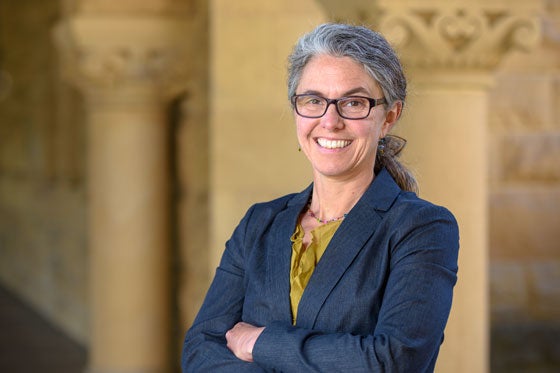A future vision for Stanford’s Greek system

Vice Provost for Student Affairs Susie Brubaker-Cole is initiating a series of discussions aimed at developing the future of Greek life at Stanford.
In a letter sent to student leaders of fraternities and sororities, Brubaker-Cole said she will be convening and appointing members to a small steering committee of students, alumni, administrators and professional staff. The committee will be tasked with holding “think- tank” discussions for all Greek chapter officers and members to share their thoughts on – and experiences in – the campus Greek system.
In her letter, Brubaker-Cole expressed her support for Stanford’s fraternities and sororities. In addition to recognizing their exemplary contributions to the campus community, philanthropic efforts and opportunities for leadership development, she acknowledged the emphasis they place on building strong friendships and community bonds.
While these organizations provide many benefits to students and the campus community, Brubaker-Cole said that she has heard students express concern about certain aspects of Greek life on campus, including inequitable access to chapter housing and a lack of diversity and inclusion across the entire system. Additionally, she said her office continues to hear reports of hazing, unsafe drinking and drug use and unsound recruitment practices.
Brubaker-Cole also acknowledged the need to further refine the university’s administrative processes for assessing Greek chapters by ensuring that expectations are communicated clearly and administered in a fair and equitable manner.
“I am committed to creating a shared process through which all of us – students, alumni, administrators and professional staff – will work together to effect lasting change,” she wrote. “Our shared goal will be to create an outstanding Greek experience that is sustainable and lives up to our high expectations: one that is fair and equitable for the extraordinarily diverse students and chapters that constitute our community; one that is proudly supported and enabled by the university and its processes; and one that is embraced and sustained by new student members for years to come.”
The steering committee will also advise Brubaker-Cole on convening a working group of students to recommend solutions to a set of key issues, including – but not limited to – (1) a framework for reviewing and evaluating Greek-letter organizations going forward, perhaps in replacement of the current iteration of the Standards of Excellence, and (2) a fair process for chapters to have access to housing.
Many in the Stanford community have raised questions about the future of Greek life in light of the ResX project to design the future of Stanford’s undergraduate residences. In her letter, Brubaker-Cole said she intends to continue the established norm of having 10 Greek houses on campus.
“However, given that our community currently includes 26 Greek organizations (many of which are seeking access to housing), we will need to consider how to create a fair and equitable housing allocation process for the future,” Brubaker-Cole said.
For one Greek house, that process will likely begin sooner rather than later. Brubaker-Cole’s announcement coincided with Stanford’s decision to not renew the term of a ground lease held by Alpha Omega House Corporation for the house at 550 Lasuen Mall, formerly 550 Mayfield Ave. The house was previously occupied by the Sigma Chi chapter, which is not currently active at Stanford. In a message sent Monday to house residents, staff and other stakeholders, Associate Dean and Executive Director for Residential Education Nate Boswell said the university intends to allocate the house to active Greek chapters recognized by the university for the academic year 2020-21.
In the meantime, Student Affairs will continue to work with and on behalf of students to ensure their experience at Stanford is sustainable and equitable. Members of Stanford’s Greek community are encouraged to participate in the forthcoming discussions with Student Affairs to establish a new level of clarity and a future vision for Stanford’s Greek system.
